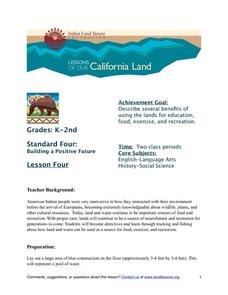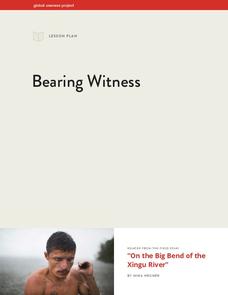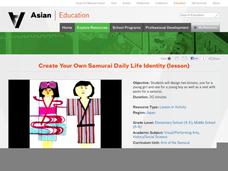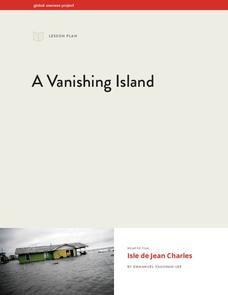Curated OER
Science Methods
Young scholars study games. In this environment lesson, students discuss which games are damaging and which are not damaging to the environment by inventing games which are not harmful.
Curated OER
Don't Call Me A Pig
First graders explore wildlife and habitats in the Arizona desert. Throughout a classroom discussion, 1st graders observe pictures of the desert and animals that live there. As they go on a nature walk around the school, students...
Curated OER
Flora, Fauna, and the Passing Seasons
Students discover representations in art, religion and cultural practices of the flora and fauna of specific geographical regions in this early elementary lesson plan. The instructional activity ends with a mural project by the entire...
Curated OER
Oklahoma Grown: Discovering Oklahoma's Agriculture
Fourth graders investigate where Oklahoma's variety of crops are harvested, and grown their own plants. A printable map and crop information guide are provided.
Curated OER
Nevada Native Plants and Animals
Fourth graders explore the Washoe people and their history among non-Washoe. The lesson focuses on not only the traditional, but also on the contemporary ways of life of the Washoe people. The unit consists of thirteen lessons.
Curated OER
Playground Mapping
Students convert their physical models of a playground from a previous lesson into a map of the playground that includes a scale and key. They examine and discuss examples of maps, view an image to map photo essay, and create a map using...
Curated OER
Living in the Greenhouse
Students discuss the different types of climate zones found throughout the world. They participate in activities which relate to real events. They make observations and the consequences of their actions on the environment.
Indian Land Tenure Foundation
A Sense of Belonging
In order to understand how the land changes over time because of the people who live there, learners interview an elderly person about the past. Children ask an older family member to describe what the local area was like when they were...
Indian Land Tenure Foundation
Gifts from Land and Water
With a series of fun hands-on simulations, young children can learn about conservation and natural resources. Your learners become land detectives, discussing and investigating the gifts that the land and water provide them. They then...
Global Oneness Project
Bearing Witness
A controversial construction project in South America, the Belo Monte dam, is endangering local cultures, ecosystems, and communities. High schoolers create a concept map based on an online article they read before engaging in discussion...
Montana State University
Everest Extremes: Biodiversity
How many animals can live in a climate as cold as Mount Everest's? Find out with a science instructional activity all about biodiversity. Activities include research, presentations, group work, coloring maps, and a simulation of a food web.
Curated OER
Exploring our National Parks
Students utilize maps/Atlases to find key spatial information, locate U.S. National Parks, characterize the geography of a specific region, and create a National Park brochure.
Arizona-Sonora Desert Museum
Desert People and the Saguaro
The saguaro is the focus of an examination of the importance of this stately cactus to the indigenous people in the Sonoran Desert.
Asian Art Museum
Create Your Own Samurai Daily Life Identity
Your class can create their own Samurai identity with craft paper and a little imagination. Learners will discuss what life was like for a Samurai warrior, and then they will make representations of what they would look like as a Samurai.
Global Oneness Project
A Vanishing Island
The effects of rising sea levels on Isle de Jean Charles, located off the coast of Louisiana, are documented in Emmanuel Vaughan-Lee's poignant short video. Viewers are asked to consider not only the plight of residents but also what...
Global Oneness Project
Rethinking the Fabrics We Wear
What are fibersheds and what what do they have to do with environmental protections? A photo essay and audio recordings about Mimi Luebbermann, and her sheep, cause consumers to reflect on how their clothing choices can support local...
Channel Islands Film
Island Cattle Ranching
Is cattle ranching on Santa Rosa island viable or non-viable? Rather than focusing on the issues of the transition of Santa Rosa island from a privately owned island cattle ranch to a national park, class members are asked to consider if...
Deliberating in a Democracy
Recycling
How often have you passed by a recycling container in your school? Scholars research the issue of recycling in the ever-changing global world. Using documentation and video evidence, they form their own opinions on recycling and how it...
Curated OER
The Landscape of France
Students create a nature journal for an imaginary trip around France. They Identify animals and plants that live in France and describe its landscape. In addition they research a period in France's history and prepare a brief summary of...
Curated OER
The Layers of the Rainforest
Fourth graders identify the different layers of the rainforest and distinguish between the plant and life forms that go along with each layer. They access websites imbedded in this plan and answer questions and draw pictures of plants...
Curated OER
Land Use Change Introduction
Students discuss the major changes that have taken place in the Hudson Valley over the past 400 years. They use aerial photos to describe major trends in Dutchess County. Students view a PowerPoint presentation. They work in small groups...
Curated OER
Nuts for Peanuts: Peanut Plants, Peanut Timeline, and Peanut-s-timation!
Students complete a timeline. In this peanuts instructional activity, students read A Short Peanut History and use this resource to make a timeline of the history of the peanut. Students can grow peanuts in the classroom or make various...
Curated OER
Where it Grows
First graders identify the commodities of Oregon and produce a map of the different commodities in different regions.
Curated OER
Body Shields: Peaceful Protesters or Iraqi Pawn?
Students research human shields, mostly European peace activists who stand against war. They guard civilian sites to prevent attack on schools, hospitals, etc. Student research is to include articles by those who support the war as well...

























